|
Interview conducted March 2 2017 Interview published March 31 2017 |
![]()
"I would have paid my ass off in the 80's or in the 90's for so many records." - Ilker Ersin
In order to take a look at the band's latest effort, Master Of Light, and about bringing back some early elements into the music lately, as well as get to know a little bit about past and maybe coming side projects, Metal Covenant locked in an appointment with Freedom Call's singer/guitarist Chris Bay and bassist Ilker Ersin when the German power metal unit visited Sweden for a four date stretch in early March.
"When I stop playing music I'll be a very sad person." - Chris Bay
![]()
Tobbe: Master Of Light was out in November last year and I think that the album contains a little bit stuff from the older days of Freedom Call and did you actually look back at those days before you went into the songwriting process or before you started to arrange stuff?
Chris: No, but I think it's the source. It's the beginning of this idea of Freedom Call and I think that it's the basis and the attitude of this band and we just tried out some different things over the years, because you're longing for it, because you're developing and you don't want to circle in the same place. But sometimes you notice "Oh, the early days weren't so bad.", so the basis comes back. That's it. But I never want to limit myself and say "We never will change anything.".
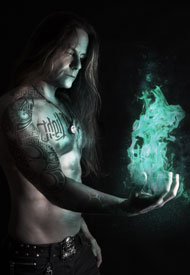 Tobbe:
And your last record, Beyond [2014], had some tendencies to go back a
long time too in a couple of songs, so maybe it's coming back?
Tobbe:
And your last record, Beyond [2014], had some tendencies to go back a
long time too in a couple of songs, so maybe it's coming back?
Chris: Yeah. So maybe you're also developing as a person and maybe that longing for having changes anyways were more balanced to the private side. So then you can do that in your private things, in your family, in your relationship, and then you go back to the basics of your music.
Tobbe: So in the fans' point of view, what does Master Of Light bring to the overall catalogue? If you look at it in a fan's perspective, what does this album bring to them?
Chris: Oh, we do not think in this complicated way. We are thinking very, very easy. The people would be very disappointed to know how easy we are thinking. Look, we do not want to write complicated things and we do not bring the people complicated concepts or whatever.
We're just writing songs to make people happy or we try to bring the people very small, tiny things, to make them live a better life than before. Or make them smile, or whatever. That's all. There is nothing beside it or nothing behind it. It's just that we can express ourselves, write songs and have fun, and that's it. Very easy.
Tobbe: So what has Ilker's return to the band made for the overall sound on the most recent recordings?
Ilker: It's totally funny that people always expect that one person can change everything. No, no, no. (Chris:) Ilker, yes. He's able to do that. Nobody else but Ilker. He has changed everything. Nothing is what it was before. [Laughs]
Tobbe: I mean, because in the period when Ilker wasn't there [Dimensions [2007], Legend Of The Shadowking [2010] and Land Of The Crimson Dawn [2012]], it was kind of a different band and the songs on the two most recent albums are, like I said, a bit similar to the older stuff. So has Ilker something to do with it, you know?
Ilker: It might be that I influence Chris maybe. Maybe he's getting a reflection from the early days because of my person. Maybe it could be the same with Daniel [Zimmermann, drums] or Sascha [Gerstner, guitar] also. You know, from the first lineup. Maybe I am an influence and maybe that came into the songwriting process, but we're not thinking about it. It's always a natural process and we are doing what we like, and that's it.
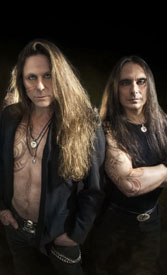 Tobbe:
About those guys, Sascha and Daniel. Do you speak to them sometimes?
Tobbe:
About those guys, Sascha and Daniel. Do you speak to them sometimes?
Chris: Yeah, of course. I was actually just talking to Daniel and he's doing great. He has built up a family, but in the musical way he has settled down. He's still playing drums of course, but not internationally. He got tired of touring and traveling a lot and he was not able to build a family. But he is doing great. He is happy. Yeah, I think that was a bigger influence, when Daniel left the band, because we were the main songwriters and Daniel was trying to go in different ways or do some experiments lyrically and also musically.
For example, the [The] Circle Of Life album [2005]. And maybe that's another reason why we returned to the early days, because I was independent to write songs. (Ilker:) Yeah, and the next thing was we played the [666 Weeks Beyond] Eternity tour [in 2015], with the old songs and we had the feeling again, and we tried to keep that feeling and the chemistry that we had in the early days. That's one of the things that keeps me alive, for example, and is for me very important.
Tobbe: When you were away from Freedom Call you made some albums with PowerWorld and if you reflect at those days at this point, what do you see?
Ilker: I made the same steps as we made with Freedom Call, but I never had a team. Chris was writing songs in the beginning with Daniel. They were the main songwriters and in PowerWorld it was only I. This is one of the reasons why I always took two years or two and a half years to make a new one, you know. And that costs a lot of energy and money. [Laughs]
Tobbe: PowerWorld hasn't officially called it quits, as far as I know.
Chris: We haven't officially quit. We are still signed with SPV as well and they're waiting for the next album, but right now I'm on tour and I'm not able to finish some things and some personal things happened in the last two years. It takes time. Good things always need time.
 Tobbe:
All Freedom Call albums of course belong to a specific type of music,
but is there a way to develop the music to something else or is it crucial
to stay on the safe side?
Tobbe:
All Freedom Call albums of course belong to a specific type of music,
but is there a way to develop the music to something else or is it crucial
to stay on the safe side?
Chris: It's easy, because an album is just reflecting your emotions in the period when you're writing the songs for a new album. It's an emotional thing. Of course I won't write a rap or a hiphop album because I'm feeling very groovy this time. [Laughs] You can calculate it, but then the people will notice that; that it's not real and not honest.
So you just have to let it go, your inspiration, your creative side, and just write songs. That's what the people like about your music. But yeah, maybe if the songs are a little bit too sad or too slow, then we have to write a bit faster grooves. You can bring some influence into the sound, but not into the songwriting. That would be unreal and synthetic and then you are sounding synthetic and the people will notice that. One reason of the success for Freedom Call is that we didn't try to bring some synthetic things into our music.
(Ilker:) Every Freedom Call album has a lot of colors and the main point is to keep the songs as Freedom Call songs. People must hear "Okay. That's Freedom Call.". It could be a ballad, or a fast one, double bass drums, or a heavy riff, but the trademarks are important, that people can recognize "Okay. This song is written and performed by Freedom Call.".
Tobbe: So you have PowerWorld, Ilker. And Chris, Have you ever thought about making a solo album in order to let out a different side of your creativity?
Chris: Yes.
Tobbe: So tell me about it.
Chris: No. We are here to talk about Freedom Call. [Laughs]
Tobbe: Not anymore. But hypothetically, if you would do a solo album, could you hire another singer for singing the songs?
Chris: For Freedom Call? No. [Laughs]
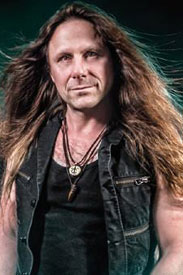 Tobbe:
Don't ruin my question.
Tobbe:
Don't ruin my question.
Chris: But I think that would be, in my opinion, a bit ridiculous to make a solo album as a singer, and then hire another singer to sing your songs, which you wrote as a singer. So no. (Ilker:) It is a different kind of view. (Chris:) It's a brilliant idea, but I'm still able to sing my songs. [Laughs] But maybe it could be a good advice to a lot of other singers, to hire a singer to sing their own songs. [Laughs] So yeah, I agree.
Tobbe: So will we have that solo album out next year?
Chris: Next year? Oh no, that's too late. [Laughs]
Tobbe: Right. So, you know, times are constantly changing and first there was all the downloading and now there's Spotify and stuff, so how does Freedom Call try to adapt to a different world?
Chris: We have to follow. We can't set trends. We don't have enough force to change it. We just have to follow. We do not have the status of a band like Metallica. Like when Metallica was trying to do something against Napster, or something like that.
But generally, my answer to all questions about internet is: "Is internet a good thing or a bad thing for the music business?". For the business side it's definitely a bad thing, because the business is just there to make money and they are making less money, so it's not good for the business. But for artists, you got a new platform, you can reach a lot of new people, for free.
I think, 15 or 20 years ago you had to pay for it, for every single person, for magazines, for advertisements, posters, radio ideas, interviews, but now you can get it for free and a lot of artists are forgetting about this side of the internet. They just see "Oh! They're taking all our money and they are listening to my music and I don't get paid for that!". Yeah, but you can reach a lot of people, I think, if you use it cleverly for your music or for your band or your project or whatever. And the other side, you can't change it. We are living in 2017.
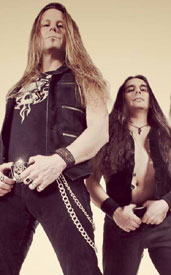 Tobbe:
Some people just shake their heads when I tell them I still buy CDs.
Tobbe:
Some people just shake their heads when I tell them I still buy CDs.
Ilker: Kids and people in general have lost their worship. You know, it's nothing worth. In my early days I was spending my money on buying one record per month and now for the kids it's nothing worth. You know, they got the cards with 1000 downloads. Unbelievable. I would have paid my ass off in the 80's or in the 90's for so many records.
(Chris:) But I think in the rock or metal scene our audience is willing to buy physical articles. They do not want to download even if they do that and the rates are increasing, but you have a chance to sell special products like boxes. And vinyl is growing. But if you're doing pop music or trendy music there's just downloads or streaming. (Ilker:) Pop music has no real artwork. Most of the pop artists have only their face on the cover. A picture. But nothing is painted, no artwork and nothing illustrated and this is a different thing and this is one of the reasons why the real rockers really wanna have a physical thing.
(Chris:) Yeah, they are collectors and they just don't wanna use music, or files. They are collectors and they follow us. But we will see and I think we always will have a discussion, like "What is the next step? What is coming after streaming? What comes after the CD?", because the fans are longing for having a product.
Tobbe: Yeah, what comes next? You never now.
Ilker: Hey! We've discovered seven new planets, okay? [Laughs] (Chris:) I think the most logical thing would be that you have a virtual thing. A mixture between internet and file and…I don't know. Just put it in your computer and you can listen to the music and you can read everything about the musicians. Maybe more information about their private life. Maybe you can also buy a view behind the scenes, the same way you can buy some VIP tickets and you're paying, like, €30 or €50 more.
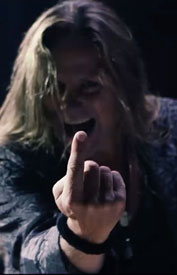 Tobbe:
Nowadays the fans are much closer to the musicians too. When I was young
it was very hard to even get to meet my, so called, idols or the people
who made the music I was listening too.
Tobbe:
Nowadays the fans are much closer to the musicians too. When I was young
it was very hard to even get to meet my, so called, idols or the people
who made the music I was listening too.
Chris: Yes, but the artists need this. They need the publicity and I think the times are over when the artist is really distant from the audience. I think they're growing together and for me it's a 100 percent positive thing, because the difference is clear and one person is standing on stage and the people are in the audience. [Laughs] I think it's working well if you have good contact with the people, because there's no stupid people that just "Oh! I love you!" and they have clever and smart questions. Interesting questions about your lyrics or about you as a person. …But please, close the door! The people are coming! [Laughs]
Tobbe: So how do you guys look at the band's future? I mean, will you be able to do this for a long time still?
Chris: We have to. I didn't learn a regular job on the side. I'm a musician and I will do this 'til I fall down dead on stage probably… hopefully, because it's the best place to say goodbye on. I can't say "All right! At 65 I will leave.". No, why? Because it's my life, it's my passion. When I stop playing music I'll be a very sad person.
Tobbe: My final question: If people are only allowed to listen to one single band for the rest of their life, why should they listen to Freedom Call?
Chris: Because they will have a better life than listening to some depressive stuff. But poor guy. Just Freedom Call. Will be suffering to the end of his days. [Laughs]
![]() See
also: review
of the album Master Of Light
See
also: review
of the album Master Of Light
Related links:
www.freedom-call.net
www.facebook.com/freedomcallofficial
![]()